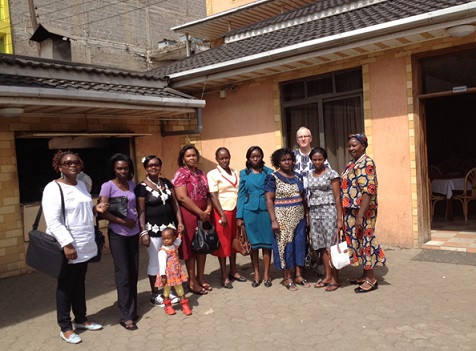By Dr Mike Calvert, York St John University, UK with help from Mary Kiguru from the Sujali Self-Help Group
To see all posts about the group and their work with microcredits, click here
 I met up with the 8 members of the SSHG and Mary on a recent trip to Nairobi. This first of three blogs focuses on the group as a whole. The second, published later this week will catch up on the ‘old’ members and third on the ‘new’ members.
I met up with the 8 members of the SSHG and Mary on a recent trip to Nairobi. This first of three blogs focuses on the group as a whole. The second, published later this week will catch up on the ‘old’ members and third on the ‘new’ members.
The lunch meeting took place in a local hotel on 24th November. There was an expectation that all would attend and, true to form, they were all there. I can report that the group meet religiously (pun intended) on the second Sunday of the month and are fined for late or non-attendance or late payments.
The group has discussed the loans that have been in place. The loan was originally set at 1% per month for loans of 3 to 5 months. The group would like to borrow over a longer period of up to a year. Ironically, this works out at a higher rate than other low rate providers. Since the original intention was not to have an interest rate of over 3%, it was suggested that they set an annual rate at 3 or 5%. Interestingly, some of the women would rather have a 10% annual rate so that any surplus can be used for training or other expenses. The decision was that they will discuss the rate that they want to charge each other.
I was able to announce at the meeting that the money available had doubled thanks to two new contributions. KES150,000 has become KES300,000. The other important development which was reported on briefly was that they are using the scheme as a way of saving. At present, they each save KES500 a month but this will increase to KES1000 in January.
The third development has seen the slowest uptake and that is training. So far this has not been possible but they recognise the importance of sound bookkeeping and being able to monitor costs and income.
The final point to make is that the group, as might be anticipated, is supporting each other by buying produce from each other. Jacinta is buying Alice’s eggs and Alice is buying Jacinta’s milk, for example.
I look forward to returning in 2015.
Current exchange rate is approximately £1 = KES140 $1 = KES90 €1 = KES110